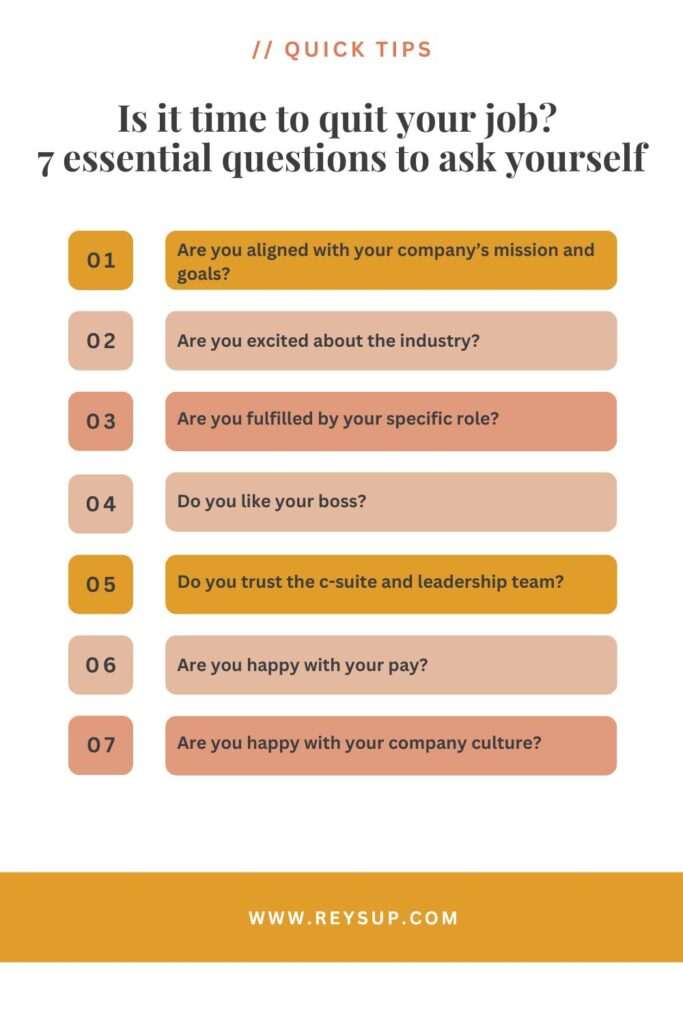In this article, we share essential questions that help you determine if it’s time to quit your job. From company goal alignment to role satisfaction, this article shared the 7 questions you need to consider.
Time to quit your job: 7 questions to ask yourself before

Taking a step back to determine if it’s time to quit your job can be daunting and overwhelming. After all, you’ve likely worked really hard to get to where you are, and the thought of stepping away can make you feel a range of emotions: regret, anxiety, and sometimes even sadness.That said, quitting can also be empowering. It can be the brave step you take that opens the door to the rest of your future.
When it comes to making this decision, many factors come into play including personal fulfillment in the role, financial opportunity, skillset alignment, and workplace relationships. In order to make the most informed decision you can make, it’s important to evaluate various aspects of your job through thorough introspection. In this article, we are sharing the list of questions you should ask yourself to determine if it is in fact time to quit your job and move on.

Are you aligned with your company’s mission and goals?
The first logical place to start when evaluating if it is time to quit your job is evaluating whether or not you align with the overall mission and guiding principles of the company. This alignment is really important when it comes to your motivation, job satisfaction, and overall sense of purpose.
Here are some questions to ask yourself to determine if it’s time to quit your job:
- Do I believe in the company’s mission and values?
- Do I believe that the work we are doing is meaningful, impactful, and important?
- Do I feel proud to be associated with my company?
- Am I inspired to go above and beyond in my role because I know we are fighting for a good cause?
Possible outcomes
- Aligned: If you truly believe in the mission and can clearly see that your contributions are going towards an effort that matters, you are likely to feel more motivated and satisfied, and feel a strong sense of belonging and purpose. Alignment with company goals could be an overarching reason to stay in the role.
- Misaligned: If you are finding it really hard to connect with your company’s mission and not feeling empowered by the company’s main objectives, you are likely to feel more disengaged and unmotivated, which in turn leads to frustration. This lack of alignment may be a strong reason why it’s time to start looking for your next tour of duty.
Are you excited about the industry?
In addition to the company mission and goals, the broader industry also plays an important factor in deciding whether or not to quit your job. Passion for what your industry does and the players in the space leads to innovation, creativity, and a desire for continued learning.
Here are some questions to ask yourself to determine if it’s time to quit your job:
- Do I find the industry trends and developments exciting?
- Does the world need this industry?
- Do I actually believe that there is a future of this industry?
- Is there room for growth and innovation in this field, or is it dominated by a single player?
- Are there any emerging policies or schools of thought that could jeopardize job stability in this industry?
Possible outcomes
- Excited: If the industry does in fact excite you and you see a clear path to a promising future, you’re more likely to be engaged and willing to put in a lot of effort into your work.
- Disinterested: If you are noticing that the industry is boring, dull, or unstable, it may be hard for you to maintain your motivation and desire to go above and beyond and this may be the reason why you start applying.
Are you fulfilled by your specific role?
Apart from broader company dynamics, it’s also really important to do some introspection around the specific role you play within the company. After all, if you love your company and its mission, but hate the way you are contributing to it, that could be the reason to leave.
Here are some questions to ask yourself to determine if it’s time to quit your job:
- Do I enjoy my daily tasks and responsibilities?
- Does my role seem more like a chore than a fulfilling career?
- Do I dread going to work each day and find myself daydreaming about other things during the day?
- Do my skill sets align with the tasks and projects I have been assigned?
- Do I feel like I can contribute in a meaningful way and make a difference in my role?
- Do I have opportunities to grow and learn in my role?
Possible outcomes
- Empowered: If you can definitively say that you enjoy your day to day, the tasks that you are responsible for, and feel like the work you are doing aligns to your strengths in a strong way, you are likely to be more productive in your role and have a higher job satisfaction. Having fulfillment in your day to day is one of the most important things to consider before leaving a job, and if you have it, it may be a strong reason to stay.
- Disempowered: If you really don’t enjoy the work you are doing on a day to day basis – even if you do align with the overall company missions – you are likely to start feeling a sense of resentment and become disengaged. There is nothing worse than being in a role that doesn’t leverage your strengths or makes you feel stagnant. If you feel this way, it’s probably a good idea to see what else is out there.
Do you like your boss?
We’ve all heard the phrase ‘people quit their bosses, not their jobs’. At ReysUp, we actually believe there is a lot of truth to this statement. A bad or micromanaging boss can be a strong reason that someone starts to explore other employment options. There is nothing worse than having to interact day in and day out with someone that you don’t get along with or someone who doesn’t trust your abilities.
Here are some questions to ask yourself to determine if it’s time to quit your job:
- Do I trust and respect my boss?
- Does my boss go above and beyond to help me grow in my career?
- Is my boss approachable, empathetic, and open to upward feedback?
- Do I feel valued, seen, and appreciated by my boss?
- Does my boss give me the space to develop and test my own ideas, even if they are wrong?
- Does my boss provide adequate support when I need help?
Possible outcomes
- Positive Relationship: If you determine that the relationship you have with your boss is a positive and healthy one, you are likely to stay engaged and feel fulfilled in your day to day. When the person that is directly responsible for your success and growth empowers you and supports you, it’s a really great feeling and a strong reason to stick around.
- Negative Relationship: The flip side of the above is equally powerful. If you realize that you can’t stand your boss, or that your boss is totally incapable of advocating for you or growing you, you will likely feel a ton of stress and dissatisfaction in your day to day. This negative relationship has the power to bleed into other aspects of the job, making it really hard for you to want to stay.
Also Read 9 Simple Ways to Improve Your Work Performance Immediately
Do you trust the c-suite and leadership team?
We’ve talked a lot about fulfillment in your role and alignment with your direct boss, but it’s also important to consider how you feel about the team at the top that is leading everyone on this journey. If you don’t have faith in your leadership team, it makes it really hard to stay motivated and engaged, and can oftentimes lead to a lot of stress and anxiety.
Here are some questions to ask yourself to determine if it’s time to quit your job:
- Has my c-suite and leadership team demonstrated an ability to lead the team with confidence and thoughtfulness?
- Do I believe the c-suite has the correct vision for the company’s future and a strong grasp on what customers need?
- Does my c-suite regularly make time to talk to internal teams about challenges and demonstrate tactical action to address said challenges?
- Is the c-suite and leadership team transparent and overly-communicative about company goals and progress?
- Do I trust that my c-suite and leadership team will make the right call if things get tough?
Possible outcomes
- Trust in Leadership: If you come to realize that you have a lot of trust in the people leading your company, and sleep soundly at night knowing that they are blocking and tackling in the right way, you are likely to feel more secure in your job and confident in your company’s future. This alignment and sense of comfort can be a powerful force, and the reason that you choose to stay in role.
- Distrust in Leadership: If you come to the conclusion that the people at the top have no idea what they are doing or that they don’t operate from a place of transparency and empathy, you are likely to feel feelings of uncertainty and concern around the company’s future and your role within it. This type of distrust can spread into other aspects of the role, and if you feel this way, it’s usually a really strong sign that it’s time to polish up your resume.
Are you happy with your pay?
Let’s be real. Money is super important, and if you don’t feel like you are being compensated for your work fairly, there is a very good chance you will become unengaged and just do the bare minimum.
Here are some questions to ask yourself to determine if it’s time to quit your job:
- Do I feel like I am being paid fairly for my skills and experience?
- Do I feel like my company has a strong benefits package?
- Do I feel like I am being paid in line with broader industry standards?
- Does my current compensation allow me to live the life I want to live?
Possible outcomes
- Satisfied: If you feel fairly compensated and your pay aligns with industry standards, you are likely to feel financially secure and satisfied with your job. This satisfaction can contribute to your overall job happiness.
- Dissatisfied: If you feel underpaid or your compensation doesn’t align with industry standards, it can lead to frustration and financial stress. Conducting research on salary benchmarks using publicly available data can help you understand if you are being fairly compensated.
By the way, here are some tips to research your pay compared to others in the industry:
- Remember to consider factors like location (are you in a big city or rural area?), experience (do you have 2 years or 10 years of experience?), and education (do you have a graduate degree?) when evaluating your salary.
- Use websites like Glassdoor to compare your compensation with industry standards.
- Search for similar roles to yours on top free job platforms. Some roles will post target salary ranges and you can use this data to get a sense of how to stack up against others in your area and line of work. If you aren’t familiar with these sites, check out our other article on top free job search platforms here.
- Network with peers in your industry to learn about how much they get paid and what typical benefits packages look like.
Are you happy with your company culture?
This one is often overlooked or put lower on the priority list, but at ReysUp we believe that company culture is super important. As employees, we spend so much of our time at work and it’s important that the environment makes us feel welcome and excited to be there.
Here are some questions to ask yourself to determine if it’s time to quit your job:
- Do I feel a sense of belonging and inclusion at work?
- Do I feel like I have a healthy work-life balance?
- Does this job align with my values as a person?
- Do I enjoy the people I work with and do I feel supported by my team and management?
- Are there ample opportunities to get to know and collaborate with peers at work?
Possible outcomes
- Positive Culture: If you find that you love your company culture and it’s an enjoyable place to work, you are more likely to be engaged and stress-free. This probably isn’t the only reason to stay in a role, but it’s certainly a positive thing to note.
- Negative Culture: If you find that your culture sucks and you are drained by the surrounding environment, you should think critically about how important it is to you and how much of an impact it has on your personal happiness. For many, a toxic workplace may be a big enough reason to walk away.
Conclusion: Making the right decision
Now that we’ve shared all of the necessary questions to ask yourself to determine if it is time to quit your job, it’s important to leave you with one final piece of advice. Even if you find that you are miserable and need to leave ASAP, it’s very important to not rush the process. That last thing you want to do is run away from something bad into something equally or possibly more bad because you made a rushed decision.
Here are some final thoughts to leave you with:
- Assess all of your options thoroughly. Not sure where to start? Check out our ‘job search’ blog page here for many articles on how to find a new job.
- Plan a strong transition: Leave on good terms, create thorough transition plans, and align internally on a timeline that makes sense for your life.
- Ask for support! Reach out to peers, past managers, or school mentors to help you navigate this new chapter of your life. It’s important to know that you are not alone.




